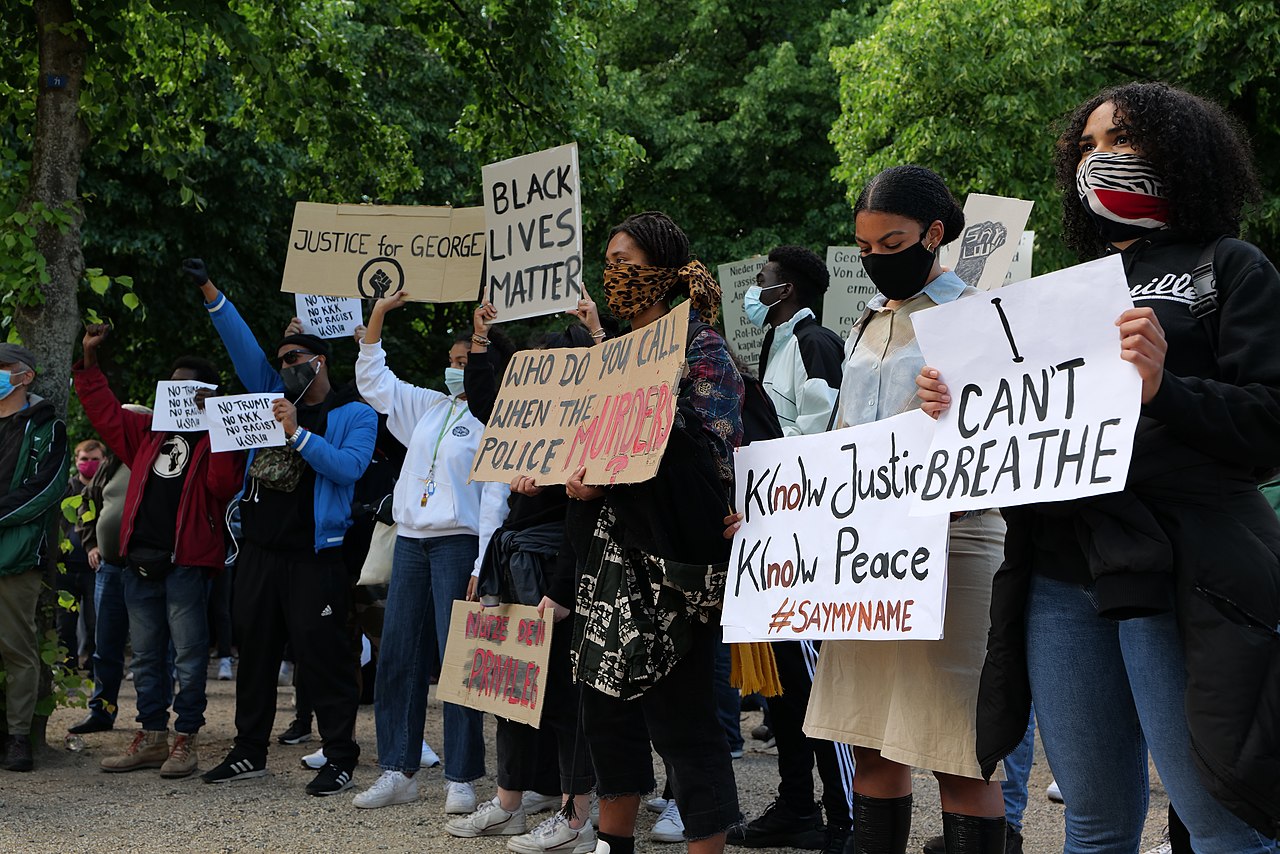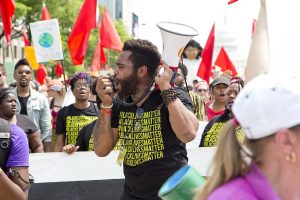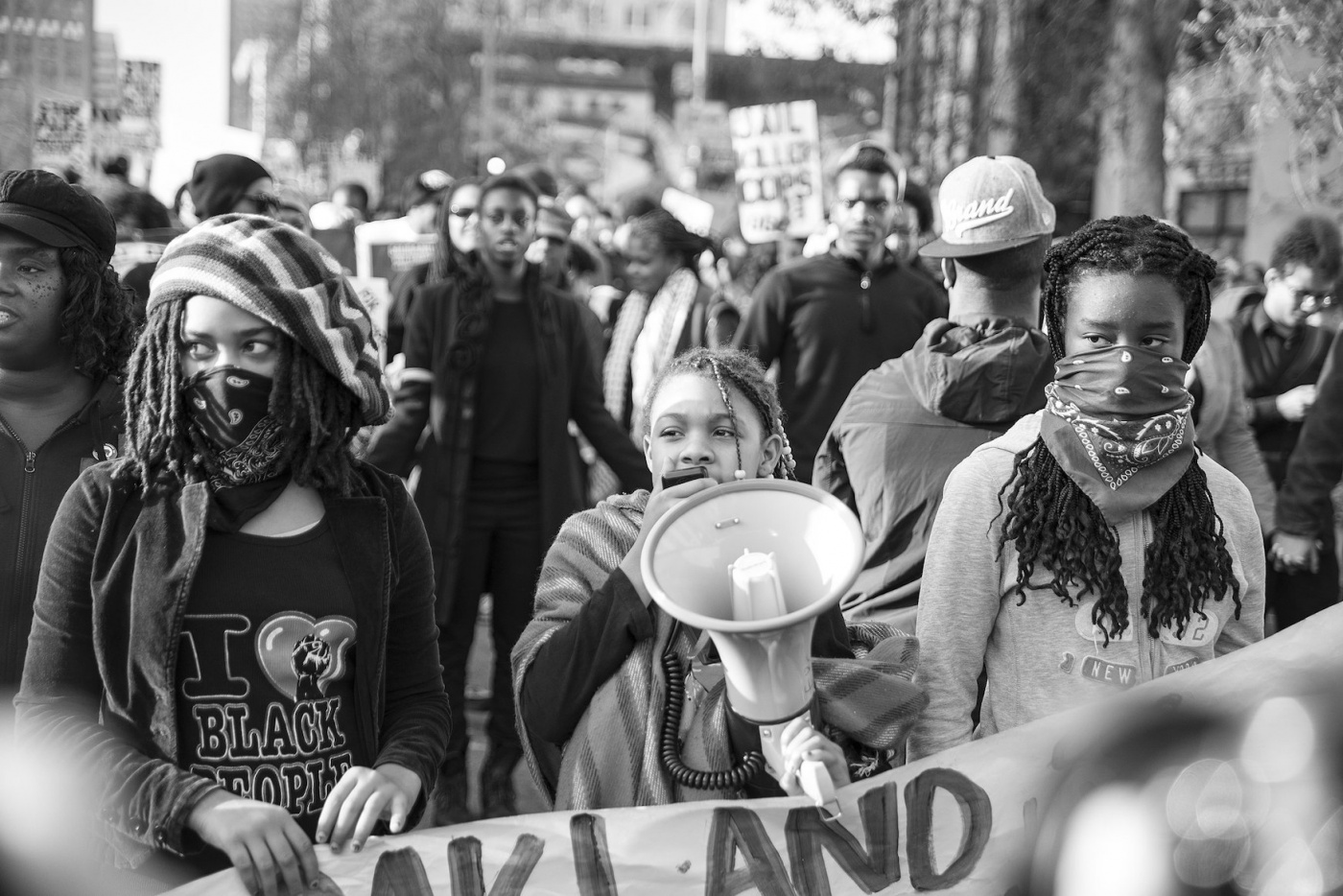
This post was written by Mercedes Navarro, with help from Michelle Clark. We thank the many SJPL staffers who contributed to the book recommendations, book lists, and resources in this post.
We are living in unprecedented times in some ways, but not entirely. While medically, the COVID-19 pandemic has negatively affected hundreds of thousands of lives—an important note that African Americans are at a disproportionally higher rate than those of their fellow white citizens to contract COVID-19, and suffer more severe symptoms—a separate problem in this country continues, as it has for centuries. A list of names stretching back generations continues to grow. The latest name added to that list: George Floyd. The systematic oppression, racism, and the killing of black men and women all over the United States has, once again, come to a boiling point.
Mr. Floyd will forever be remembered as a kind and loving man, but also as yet another black man whose life was taken by a person sworn to serve and protect the very man he killed. The murderer, a white police officer, was recorded in broad daylight with his knee on the back of Floyd’s neck until well after he fell unconscious and a few hours later, died. Floyd’s last words, “I can’t breathe” echoed another black man, Eric Garner, who was also needlessly killed by an NYPD officer in 2014. This latest killing illustrates the pain, suffering and injustice black people face for one simple reason: they’re black.
Now, all over the world, protests are being held to not only remember George Floyd, and the hundreds of others whose lives were taken from them, but to demand justice for the hundreds of years of hatred towards and violence done to black people and people of color every single day.
“... a riot is the language of the unheard. And what is it that America has failed to hear?”
—Dr. Martin Luther King, Jr.
That is a question we, as a nation, must continue to ask ourselves: WHAT HAVE WE FAILED TO HEAR?

It’s easy to fall into the trap of guilt, defensiveness, and fear. It’s easy to adopt the Us vs. Them mentality. It’s easy to write off these protests as a group of angry thugs who cause unnecessary destruction in our cities. Real lasting change is never easy and very often comes with periods of discomfort. Sit with this discomfort and find out where it’s coming from. Have those difficult conversations with yourself and then with each other. There are hard questions we must tackle If any justice is to be served, and any change is to happen so that the root of racism is dug out and destroyed. Keep asking yourself: What is my privilege? How can I use my privilege to lift up the voices of others who aren’t being heard? How do I hold those in power accountable for their actions? What can I do to contribute to a solution?
We all need to do the work. We need to educate ourselves and those around us and never stop learning. Listen to black voices and the voices of other people of color. Celebrate black lives and black futures, beyond just Black History Month. Support black voices, efforts, and businesses. Take care of yourselves and each other to keep the momentum going—this is going to take a long time.
Much more has happened in the past few weeks:
- In Minneapolis, where George Floyd was murdered, City Council has defunded their police department to create a new Department of Community Safety and Violence Prevention.
- In one month, four Black men across California, Texas, and New York City, were found hanging from trees in public areas, all immediately ruled suicides and only after public outcry were they more fully investigated.
- Oakland Unified School District has defunded their police budget, removing all officers from school campuses.
- New scrutiny and calls for justice over the 2019 killing of Elijah McClain, a 23-year-old Aurora, Co., Black man who was brutally beaten by police officers as he walked home.
- Mississippi is redesigning their state flag to remove the Confederate Flag.
- More evidence of systemic racism was uncovered in our local police department.
- Statues and other monuments commemorating Confederate leaders are being torn down and removed; same for statues commemorating Christopher Columbus across North America.
- Calls for legislative action to repeal Qualified Immunity on a Federal level.
- Still no action taken to arrest the officers involved in the killing of Breonna Taylor, a Louisville EMT shot by police in her home while she slept; protestors in Louisville have continued to demand action.
This is just the beginning. More work must be done, both with ourselves and with each other. Here’s where we can start.
Educate Yourself
Something Happened in Our Town by Marianne Celano, Donald Moses
It’s never too early to start having conversations about racism, prejudice, and even police brutality with your children. Something Happened in Our Town is a children’s book that tackles both of these topics. Use this as a starting point for having your own conversations with your children and your family.
Stamped: Racism, Antiracism, and You by Ibram X. Kendi, Jason Reynolds
Keep the conversation going with your teens. They may already be well aware of the injustices that are happening to people who look like them or their friends. It’s important that their feelings, fear, and anger are validated. Stamped: Racism, Antiracism, and You is a brand new adaptation of Ibram X. Kendi’s Stamped from the Beginning, with renowned YA author Jayson Reynolds. It covers a history of racist and antiracist ideas from America from their roots in Europe until today. Suitable for teens and adults alike, we recommend reading either. For parents, read along using the original published work by Kendi and compare notes.
So You Want to Talk About Race by Ijeoma Oluo
Despite this title being published 2 years ago, Ijeoma Oluo’s essays about privilege, police brutality, intersectionality, micro-aggressions, and the Black Lives Movement still resonate loudly. Oluo makes clear those concepts that continually to elude everyday Americans with an effective straight-forward manner and even a little bit of humor. "You are going to screw this up royally. More than once," Oluo notes urging readers to push past their discomfort, in order to see how they can work toward real change in this country.
SJPL Staff have created numerous book lists that should provide you with plenty to read to educate yourself and recommend to others. Many are available as eBooks, which can be borrowed even while our branches are closed:
- An Antiracist Reading List
- White Privilege, Black History, and Our Country's Justice System
- Black History Essentials
- If You Liked: How To Be An Antiracist
- Black Lives Matter
- #BlackLivesMatter for Teens
- Antiracist Picture Books for Elementary Students
- A Kid's Antiracist Reading List
Get Started With These
Plenty of others elsewhere have book lists, too, that are worth your attention. Booklists for talking to children about racism; prompts for sparking inspiration for big and little projects to help push the conversation further; lists for you to help pick out diverse books for your children to read; and books you can show your teachers and school administrations to start adding to their curriculum. Parents can also find help with these resources, too, if they just don't know where to start.
There are lists with books for teens. There is a big list of anti-racist graphic novels (selected by the Black Caucus of the ALA and the ALA's Graphic Novel and Comics Round Table). There are lists with so many books for adults.
Listen, Elevate, & Celebrate Black Voices
Break out of your social media bubble and start following folks who are different from you (this includes LGBTQIA+ of color, as well). Here are some just to get you started:
- @kamalaharris
- @barakobama
- @kaepernick7
- @janellemonae
- @lupitanyongo
- @theconsciouskid (specifically for parents)
Keep in touch with national organizations, too, which will more than likely have stories from around the country that aren’t big enough for national coverage:
Listen to their stories. Learn about their experiences with these podcasts:
- Code Switch from NPR
- Race Matters
- 1619 from The New York Times (and a recipient of this year’s Pulitzer Prize)
- Seeing White from Scene On Radio
Broaden your perspective with black stories and support black authors, too:
Act
If you are uncertain where to get started—and that’s totally understandable—it's important to remember that a lot of work has already started and has been in the works by Black-led organizations. It is vital as a white person to follow their lead and direction. Showing Up for Racial Justice (SURJ) is an organization for mobilizing, educating, and holding accountable while folks to work for racial justice. SURJ follows the lead of BIPOC-led organizations and provide support where needed. They regularly host new member orientations. You can find a local chapter near you and get to work right away.
Challenge
Challenge your workplace’s organization culture and ask what they are doing to actively create environments that are open to diversity and equity. If you are unsure where to begin, start by seeking out organizations and consultants who actively work with helping organizations shift their cultures. Then ask your employers to consider working with them.
Support
If you cannot be on the frontlines of change and following the guidance of black leaders, there are plenty of other ways to support them and other causes that aim to upend systemic racism and social inequity. Guides for how to support organizations (with your dollars or with your work), both national and local, are available online and are a good starting point for where to give your support—consider recurring donations and getting matched by your employer, if you can. Make your everyday spending mean something by supporting Black-owned small business and local restaurants? Looking for more? Browse this outstanding Google Doc for a comprehensive list of resources, websites, articles, books, movies to get you started.
Change isn’t perfect and neither are you. Be prepared to make mistakes along the way. Check your feelings and make the honest intention to learn, listen, and change. Do the work and show up for each other. We cannot stop until the day comes when mothers and fathers no longer worry about their children being killed for being black.




Add a comment to: Race. Inequity. Protests. You.